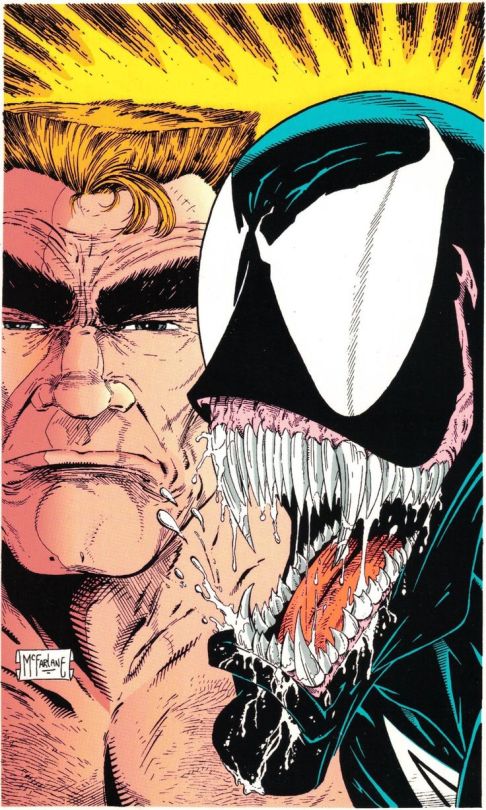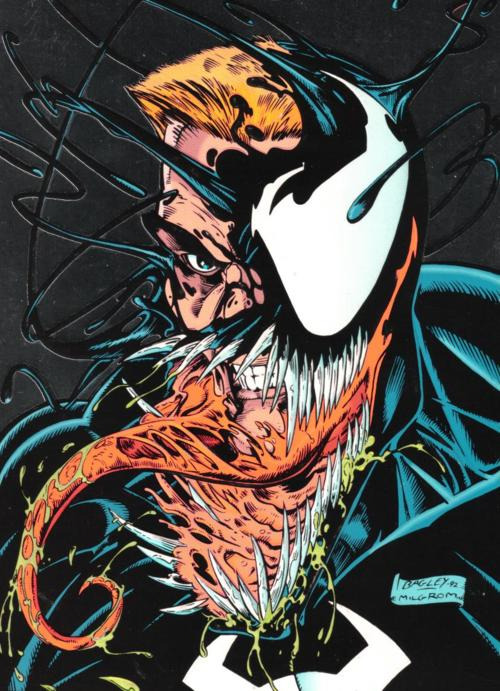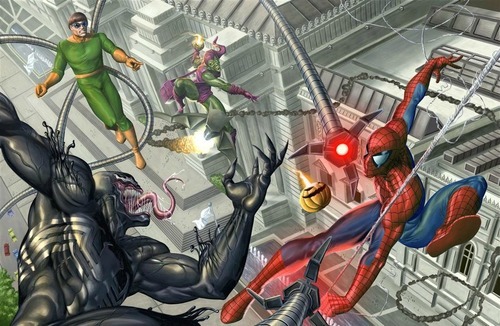Today is marks the 30th anniversary of ASM #299, the first time Venom was fully revealed to us. What better time could there be to bite the bullet and start to address the biggest criticism of Venom; Eddie Brock’s motivations.

It is time to dive into the final criticism I proposed back in Part 1
- Eddie Brock’s motivations for hating Spider-Man are weak and make no sense
Initially I was going to tackle this in just one post but to really dissect it properly I’ve opted to make multiple posts. So just bear in mind the next several posts are all highly interconnected as they all address the above point.
Before going forward I’d also advise you refresh your memory of the four pages detailing Brock’s origin from ASM #300 or check out Part 1.
You done? Excellent now we can get cracking.
Evil Ambitions
So in brief, the key to understanding Eddie Brock and his motivations is to appreciate the fact that…he is crazy.
Well actually that is oversimplifying it. Often villains’ actions are hand waved on the basis that ‘they are crazy’, thus lazily justifying anything and everything they do.
However in the case of Eddie Brock the reality is that we can actually be a lot more specific than that. We can dive deep into his mind to explain why he does what he does in ASM #300 and why his origin does make sense from his own twisted point of view; let alone his core creative concepts and intentions.
To understand this POV we have to appreciate that Brock is not only crazy when we meet him in ASM #300, but might have just been an immoral person in the first place.
Whilst you could interpret it differently, for now let’s presume Eddie Brock was not truly mentally unstable before he lost his job as a journalist. With that in mind, during the flashback to his past in ASM #300 he comes off as highly ambitious; ambitious in fact to the point of being selfish and unethical. He is also patently hypocritical (remember that for later) and likely somewhat narcissistic too; the latter very much plays into his perception of himself as an ‘innocent victim’.
These elements of his character are rather nicely illustrated in the canonically dubious Uncanny Origins #7 which retells Brock’s origin.

This ambition, hypocrisy and ethically dubious attitude was present before his career and life falls apart and before he gained the immense power of the Venom symbiote.*
Original Sin
So Eddie Brock seems to have always been a pretty twisted individual and the most obvious example of this is depicted in his recounting of his history with the Sin Eater.
To begin with Brock begins his account by claiming he was a respected journalist, a potential sign of his own ego and narcissism. But even if you don’t buy that consider the fact that upon being contacted by the alleged Sin Eater Brock:
- Protected Sin Eater’s identity
- In Brock’s own words told his story ‘compassionately’
- Only revealed his identity after being pressured into it by the authorities and legal counsel
Remember the Sin Eater was someone who was (as far as anyone knew) a vicious and highly dangerous murderer who’d killed a respected female police officer, let alone anyone else.** We do not know when precisely Sin Eater contacted Brock, but in the previous instalment I speculated that it made the most sense for Brock’s final article to have been published closer to Gregg’s invasion of the Bugle. With this in mind it is likely that Sin Eater had already killed a priest and a judge (both of whom were respected by most of the public) when Brock was first contacted.
This means that despite popular public opinion, very obvious journalistic ethical practices, common human decency and Brock’s own alleged Catholic beliefs he willingly and knowingly allowed a known killer continue to be at large and endanger other ‘innocent’ people.
Why would Brock do this though, again dismissing the possibility that he was already (at least significantly) mentally disturbed?
Well to answer that just look at the impression the readers are left with from Brock’s accounting of his and Sin Eater’s relationship. It seems very possible that he might have allowed Sin Eater to remain free because he knew writing such an article would garner a lot of attention and prestige.
The latter notion is supported when you consider his articles became sensations and he apparently didn’t fact check them very closely. At the very least this alludes to him being selfishly ambitious as I mentioned above. After all why waste time fact checking when you have a hot story that could slip away at any moment?
In Brock’s defence fact checking might have been easier said than done. Emil Gregg in the original Sin Eater storyline believed himself to be the Sin Eater since he lived next door to Stan Carter and overheard the latter’s audio diary through the walls of his bedroom. Believing these recordings to be voices in his head he consequently thought that he was the genuine killer.
We do not know the details of what Carter recorded and by extension what Gregg could’ve conveyed to Brock. But presumably they must have been fairly convincing details only the killer would know or details that would otherwise line up with the real Sin Eater’s crimes. These unto themselves would’ve been fairly convincing thus Brock might’ve thought he didn’t need to fact check. However even if Brock were to attempt to further corroborate Gregg’s story that would have involved him:
- Meeting Gregg face-to-face, which would be incredibly dangerous if he was who he claimed he was
- Finding evidence to show that Gregg was in a different location at the time of the Sin Eater’s murders. Given Gregg’s mostly reclusive life this might not have been possible.
Alternatively of course it’s not impossible to argue that Brock might have tried fact checking things short of outright seeing Gregg in possession of the Sin Eater’s clothes and weapons. But he just screwed up in the course of that fact checking not taking Gregg’s mental issues into account or considering his detailed knowledge of the Sin Eater’s plans could be explained another way.
Compassion for a killer
Brock’s claim that he told Sin Eater’s story ‘compassionately’ is also rather illuminating in regards to Brock’s personality.
There are two ways of looking at his decision to go for that angle.
The first way ties back to Brock’s overall selfish ambition. He might’ve sought to write a sympathetic account of Gregg’s situation specifically to win praise and popularity. Many real life authors’ before and after ASM #300’s publication have made a lot of bank off of getting into the minds of murderers and other such individuals. Gitta Sereny in her book ‘The Case of Mary Bell: A Portrait of a Child Who Murdered’, is but one example.
Or to use a famous fictional example, in the iconic graphic novel ‘The Dark Knight Returns’ author Frank Miller criticizes such people through the character of Doctor Bartholomew Wolper. In the story Wolper presents a sympathetic attitude to the super villains Two-Face and the Joker, claiming them to be victims of Batman. However the former quickly returned to a life of crime following his ‘reform’ (which Wolper was directly involved with) and the latter went on to murder Wolper on live television before going on a killing spree.
The second way to look at Brock’s ‘compassionate’ story is to believe he was legitimately sympathetic towards Gregg.
This is corroborated by his protecting Gregg’s identity, only revealing it after being personally pressured. Logically protecting Gregg’s identity would land Brock in trouble with the authorities, raise questions among his peers and might even damage the reputation of the Daily Globe.
Revealing the identity of Gregg would not only avoid all that but also serve to boost Brock’s own career and prestige, not unlike Woodward and Bernstein. He could still tell Gregg’s story (compassionately or otherwise) and so further increase his reputation as a respected journalist.
The fact that Brock chose not to avoid those problems and not take up the advantages by betraying Gregg’s trust (until pressured to do so) heavily implies that Brock did in fact feel some kind of genuine compassion for him.
This was not entirely unreasonable on his part. Gregg was genuinely remorseful of his ‘crimes’, had a history of mental illness he might have informed Brock about and he (like Brock) was obviously a man of faith, as evidenced by his visits to Church during the original storyline.
Furthermore, Brock might even have agreed with Sin Eater’s crusade against people who were ‘soft on crime’.***
Most of these points could similarly apply to the legitimate Sin Eater Stan Carter, whose mental instability, remorse and disabilities (caused by Spidey) were eventually all public knowledge. This is especially detailed in the Return of Sin Eater storyline that played out across Spectacular spider-Man #134-136.






Along with his record of service as a police officer and agent of S.H.I.E.L.D. Brock might’ve felt similarly compassionate towards him too. The latter point is somewhat supported by Brock’s respect for heroes like Johnny Storm as seen in ASM #362 which Michelinie also penned.


This is not to say that most people would naturally feel sympathetic to Gregg or Carter if they knew them to be violent serial killers. And of course it was wholly unethical for anyone to cover their identities in any way under similar circumstances. My point is to illustrate how it’s not a massive leap to imagine how Brock personally might have arrived at those feelings of ‘compassion’, hence his shielding of Gregg and his lack of condemnation of Carter.
However, caring so much for the victimizer over his victims/future victims that he’d outright shield him reveals Brock to be a morally twisted (possibly mentally unstable) person.
Indeed, Brock feeling compassion for someone like the Sin Eater actually makes an alarming amount of sense given his future as Venom. After all Sin Eater and Brock as Venom had more than a few similarities.
- Both were mentally unstable
- Both had suffered in the course of their life
- Both were in a bad place in their life when they (seemingly in Gregg’s case) started down violent moral crusades
- Both violently killed people they judged as guilty based upon deeply held religious beliefs
- Both barely (if ever) acknowledged any innocent people they hurt in pursuit of their crusades
In our next instalment we touch on an all too human trait vital to grasping Brock’s character: hypocrisy.
*For many people obtaining the power the symbiote provided would likely have taken them on a huge power trip. But I will talk more about that in the Appendix.
** Jean DeWolff being female likely (at least in the 1980s) would’ve served to make the Sin Eater seem all the more monstrous to the public. The same is true of another of Sin Eater’s victims, an old black priest, a fact actually acknowledged in the original story.
***In ASM #300 Brock’s dialogue more than once refers to ideas of ‘the innocent’ and punishing ‘the guilty’, albeit not necessarily consistent in those strict terms. Of course these concepts would go on to be massive parts of Brock’s character in the future, for better or worse.









